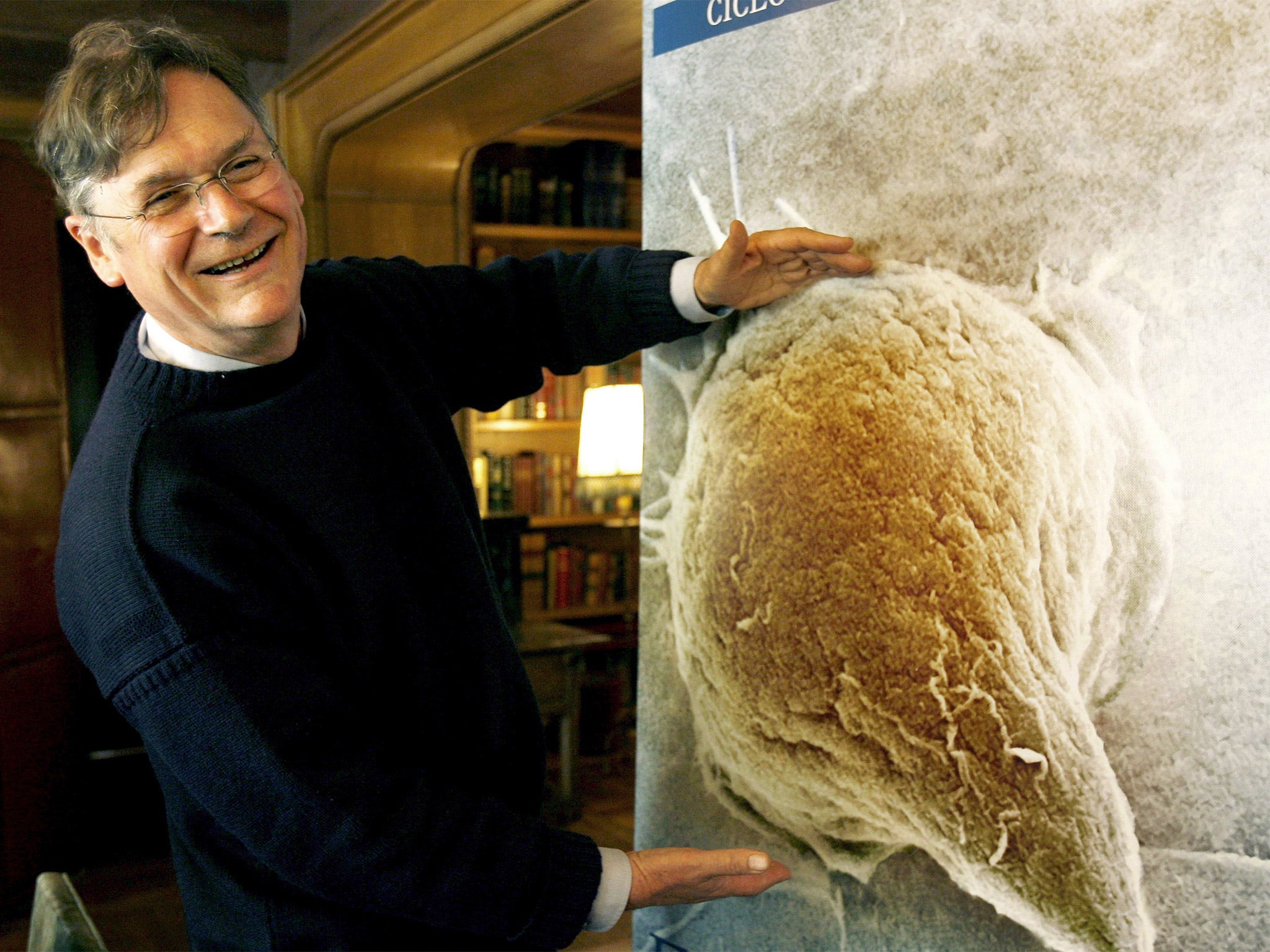Sir Tim Hunt's sexist remarks: With lab rats like him, is it any wonder there’s a shortage of women in science?
Research shows that only 16 per cent of full-time professors in science, engineering and technology are female


He has, if nothing else, empirically proved that if you want to “joke” about “the trouble with girls” in science, the best place to do it is probably not at a lunch sponsored by leading female scientists at a conference full of journalists.
Sir Tim Hunt, the hitherto universally respected Nobel Prize-winner and Fellow of the Royal Society, found himself the focus of global outrage after telling a lunch sponsored by “powerful, role-model female scientists” at the World Conference of Science Journalists: “Let me tell you about my trouble with girls.
“Three things happen when they are in the lab: you fall in love with them, they fall in love with you, and when you criticise them they cry.”
He was, he reportedly added, “in favour of single-sex labs.” For good measure, although possibly superfluously, Sir Tim also said he had a reputation as a male chauvinist.
According to Connie St Louis – a lecturer in science journalism at City University who was at the event and, of course, reported on it – when Sir Tim’s talk came to and end “there was this deathly silence. A lot of my colleagues … couldn’t believe somebody would be prepared to stand up and be so crass, rude and openly sexist.”
Perhaps it was inevitable that Sir Tim would wish to apologise. Which he did, in inimitable style. “I’m really, really sorry I caused any offence,” he began, telling BBC Radio 4’s Today programme that he had intended his comments to be “light-hearted” and “ironic”.
“I did mean the part about having trouble with girls,” he continued. “I have fallen in love with people in the lab, and people in the lab have fallen in love with me. It’s very disruptive to the science because it’s terribly important that in a lab people are on a level playing field.
“I just meant to be honest, actually,” he concluded.
Twitter was not forgiving. Sir Tim, who won the 2001 Nobel Prize for physiology or medicine, was compared to the main character from Ian McEwan’s novel Solar, “a Nobel winner and a total moron”.
Professor Jean-Pierre Bourguignon, President of the European Research Council (ERC) which funded Sir Tim’s fateful trip to the conference in South Korea, insisted the Sir Tim was no sexist. “In his main speech he was very supportive towards women in science. On the ERC Scientific Council he has only ever been a supporter of gender balance.”
But the affair has led to increased attention on women’s under-representation in science, with research last November showing that only 16 per cent of full-time professors in science, engineering and technology are female.
Helen Wollaston, the director of WISE, the campaign to promote women in science, technology and engineering – whose own research puts women working in these sectors at 13 per cent – said Sir Tim had “played right into” the stereotype of scientists as geeky men who were happy with Bunsen burners and computers but utterly flummoxed by women.
She told The Independent: “When you ask primary school children to draw a scientist, they come up with a man who looks like Einstein, with spiky hair. It’s a stereotype that’s seriously unhelpful ... it puts girls off going into science because they don’t want to be thought of as geeks.”
She added: “The stereotype is not an accurate reflection of scientists, male or female.”
The furore came a day after computer giant Intel launched a $125m (£80m) fund to combat what’s reported to be one of the biggest problems in Silicon Valley: gender and racial imbalance in the workforce.
Allegations of a “boys’ club” culture also surfaced in February when Ellen Pao, 45, sued the venture capital firm Kleiner Perkins Caufield & Byers – an early investor in Google – claiming women were not invited to a dinner with a tech firm client because they “kill the buzz”.
The allegations were denied and Ms Pao, who is now appealing, lost her case – but not before Deborah Rhode, a Stanford University law professor, told one newspaper that Silicon Valley was “almost as bad for its misogyny as the Wall Street of the Eighties”.
Also facing scrutiny over the “trouble with girls” remarks was Britain’s Royal Society, whose president just happens to be Sir Paul Nurse, who shared the 2001 Nobel Prize with Sir Tim, in recognition of their work on the cell cycle.
The Royal Society swiftly issued a statement, stressing that Sir Tim’s comments “in no way” reflected its views.
By the end of the day, however, it was facing a petition demanding it elect its first woman president since being founded in 1660. It was started by Ms St Louis, who called the society’s response “feeble”. A Royal Society spokesman admitted that only about six per cent of its fellows were female but urged: “You have to look at the pool from which they are elected. At the right level, professors, women are spectacularly under-represented: there is a much deeper rooted problem in the scientific community.”
He said the society was “still considering the implications of the comments” before deciding what action to take.
Ms Wollaston, of WISE, insisted: “There’s always a silver lining. This has galvanised a campaign: people will want to join the ranks of those who want more diversity in science.”
Whether Sir Tim will view it that way remains to be seen. The Independent was told his wife, the scientist Professor Mary Collins, of University College London, was “unavailable”. She has yet to comment on the controversy – in public, at least.
Join our commenting forum
Join thought-provoking conversations, follow other Independent readers and see their replies
Comments